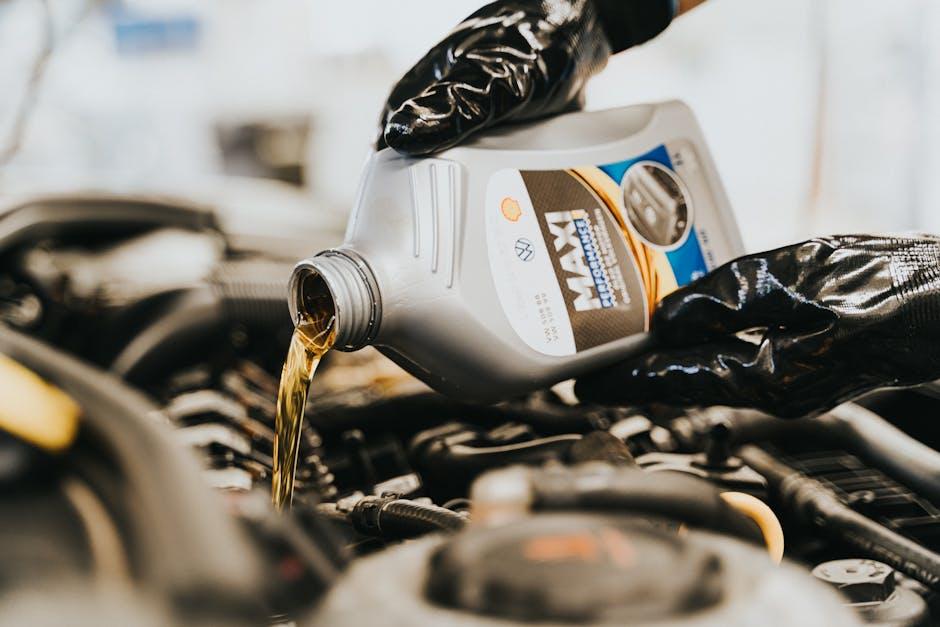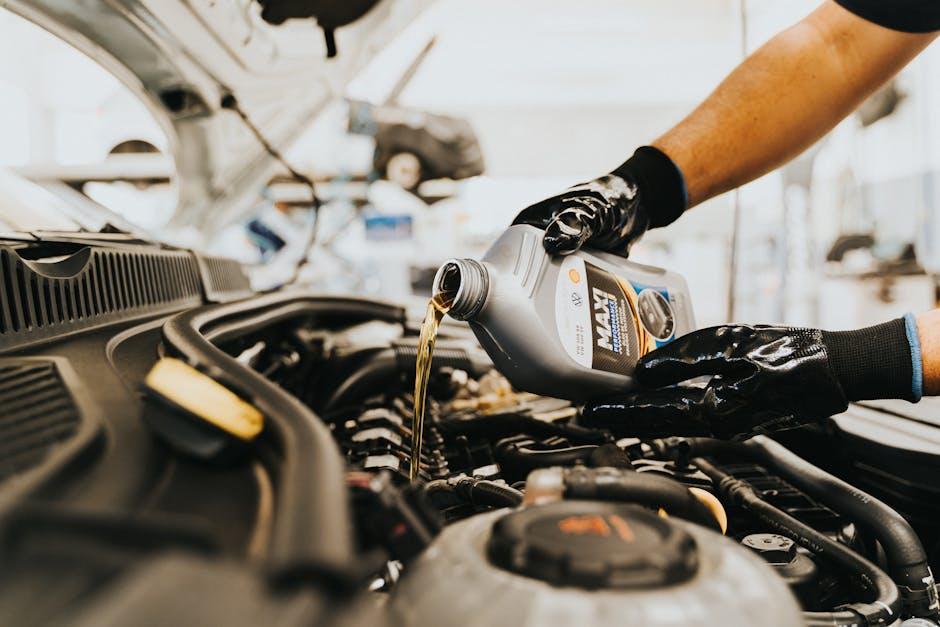Imagine your car as a living, breathing machine — a complex symphony of parts working in harmony to get you from point A to point B. Among these parts, one unsung hero takes on a vital role: the engine oil. It lubricates, cools, and cleans, tirelessly ensuring your engine runs smoothly. But what happens if you decide to skip an oil change? This seemingly small neglect can set off a chain reaction beneath the hood, with consequences that might surprise you. In this article, we’ll explore exactly what goes wrong when fresh oil is put on hold, and why staying on top of this routine maintenance matters more than you might think.
Table of Contents
- Understanding the Role of Engine Oil in Vehicle Health
- The Immediate Consequences of Skipping an Oil Change
- Long-Term Damage and Repair Costs to Anticipate
- How Skipping Oil Changes Affects Fuel Efficiency
- Signs Your Engine is Telling You It Needs Fresh Oil
- Practical Tips to Stay on Track with Oil Change Maintenance
- Q&A
- To Wrap It Up

Understanding the Role of Engine Oil in Vehicle Health
Engine oil is the lifeblood of your vehicle’s engine, serving far more than just a simple lubricant. It reduces friction between the thousands of moving parts inside the engine, preventing excessive wear and tear. Over time, oil also helps cool the engine by carrying heat away from critical components. Additionally, it acts as a sealant to maintain compression and traps dirt, metal shavings, and other contaminants to keep the engine clean. Without fresh oil circulating regularly, these essential functions are compromised, leading to a cascade of mechanical issues.
When oil ages and degrades, several problems start to emerge:
- Increased engine friction causes parts to wear out faster.
- Overheating becomes more common as the oil’s cooling ability diminishes.
- Sludge accumulation clogs oil passages, restricting flow and lubrication.
- Reduced fuel efficiency as the engine labors harder.
Below is a simplified guide showing how oil condition can directly affect engine performance:
| Oil Condition | Engine Performance | Risk Level |
|---|---|---|
| Fresh oil | Optimal lubrication, smooth operation | Low |
| Used oil | Reduced lubrication, minor wear | Medium |
| Old/Neglected oil | Poor lubrication, overheating, sludge buildup | High |

The Immediate Consequences of Skipping an Oil Change
When you delay changing your engine oil, the first noticeable effect is often a decline in your car’s performance. Old oil loses its ability to lubricate properly, causing increased friction between moving parts. This heightened friction not only forces your engine to work harder, but it also leads to excessive heat generation, which can result in early wear and tear. You might start experiencing rough idling, reduced fuel efficiency, or an unusual engine noise—all subtle warnings that your engine is struggling without fresh lubrication.
On a mechanical level, the degradation of oil leads to the accumulation of sludge and harmful deposits. These impurities hinder the oil’s flow, causing blockages in critical areas like oil passageways and filters. The table below highlights some common immediate effects of neglecting an oil change and their possible impacts:
| Symptom | Potential Impact |
|---|---|
| Engine knocking noises | Possible damage to pistons or crankshaft bearings |
| Decreased fuel economy | Higher running costs due to inefficient combustion |
| Overheating | Increased risk of engine seizure |
| Warning lights illuminate | Signs of oil pressure or filter issues |

Long-Term Damage and Repair Costs to Anticipate
Failing to change your oil regularly sets off a chain reaction of long-term mechanical problems that can silently drain your wallet. Dirty oil thickens and loses its ability to lubricate essential engine parts, leading to increased friction and overheating. Over time, this wear can cause irreversible damage to the pistons, crankshaft, and cylinder walls, eventually resulting in a complete engine seizure. The once simple task of an oil change escalates into costly repairs, including major overhauls or even engine replacements, which can set you back thousands of dollars.
Here’s a snapshot of potential repair costs that might arise from neglecting timely oil changes:
| Problem | Estimated Repair Cost | Impact Level |
|---|---|---|
| Engine Overhaul | $3,000 – $5,000 | High |
| Oil Pump Replacement | $500 – $1,200 | Moderate |
| Valve Train Repair | $800 – $1,500 | Moderate |
| Complete Engine Replacement | $4,000 – $7,000+ | Severe |
To avoid being caught off-guard by these expenses, it’s crucial to listen for early warning signs such as engine knocking or decreased fuel efficiency. Remember, consistent maintenance isn’t just about preserving your car – it’s an investment in your peace of mind and financial well-being.

How Skipping Oil Changes Affects Fuel Efficiency
When you delay an oil change, the engine oil becomes thicker and contaminated with dirt, debris, and metal particles. This increased viscosity forces the engine to work harder, leading to increased friction among moving parts. As a result, your engine’s efficiency drops, causing your fuel consumption to rise. The lubrication that fresh oil provides is essential to minimize energy waste; without it, your engine burns more fuel to overcome internal resistance.
Moreover, skipping oil changes can cause buildup in critical engine components, reducing airflow and disrupting optimal combustion. This further exacerbates fuel inefficiency and can trigger warning lights on your dashboard. To visualize the impact, here’s a simple breakdown of fuel efficiency changes related to oil condition:
| Oil Condition | Engine Friction | Fuel Efficiency |
|---|---|---|
| Fresh Oil | Low | Optimal |
| Used Oil (on time) | Moderate | Slightly Reduced |
| Overdue Oil Change | High | Significantly Reduced |
- Increased engine friction makes your car consume more fuel.
- Dirty oil hampers smooth engine operation, lowering miles per gallon.
- Neglected maintenance can ultimately lead to costly repairs that affect overall vehicle efficiency.

Signs Your Engine is Telling You It Needs Fresh Oil
When your engine starts sending subtle warnings that it’s craving fresh oil, it’s crucial to pay attention. One of the most common signs is an engine knocking or ticking noise, caused by metal parts rubbing more vigorously due to insufficient lubrication. You might also notice a drop in fuel efficiency, which happens because the engine works harder when oil is dirty or too low. Another red flag is dark, gritty oil visible on the dipstick, indicating that contaminants are no longer being flushed away properly. Additionally, a check engine light might illuminate if the oil sensor detects trouble, a warning message urging you to act before damage occurs.
- Persistent engine overheating
- Rough idling or engine stalling
- Excessive exhaust smoke
- Oil change or maintenance reminder light
Some of these symptoms often appear together, signaling that the oil is failing to protect vital engine components. Below is a quick reference table to help you identify what each symptom might mean for your vehicle’s health and urgency:
| Symptom | Possible Cause | Action Needed |
|---|---|---|
| Engine knocking sounds | Oil breakdown, insufficient lubrication | Change oil immediately |
| Check engine light on | Oil pressure or sensor issue | Diagnose and replace oil if needed |
| Dark, dirty oil on dipstick | Contaminated oil | Schedule oil change |
| Excessive exhaust smoke | Oil burning due to leaks | Seek mechanic repair |

Practical Tips to Stay on Track with Oil Change Maintenance
Keeping up with your vehicle’s oil change schedule is easier when you establish a routine and leverage useful reminders. Consider setting calendar alerts on your phone or using car maintenance apps that track mileage and notify you when an oil change is due. These tools help prevent the common pitfall of forgetting service dates, especially during busy periods. Another effective approach is to combine oil changes with other routine maintenance tasks, such as tire rotations or brake inspections, turning them into a single visit—saving both time and effort.
Here are some smart habits to keep your oil change maintenance on point:
- Track mileage precisely: Note your last oil change and set reminders based on manufacturer recommendations.
- Keep a service log: Maintain a simple notebook or digital file to record oil types and service dates for quick reference.
- Choose quality oil: Use the oil grade recommended by your vehicle’s manufacturer to optimize engine health.
- Understand your driving conditions: Severe weather or frequent short trips might require more frequent oil changes.
| Tip | Benefit |
|---|---|
| Set digital reminders | Never miss an oil change date |
| Maintain a service log | Track maintenance history easily |
| Use recommended oil type | Protect engine performance |
| Adjust frequency for conditions | Ensure timely oil changes under stress |
Q&A
Q: What happens if you skip an oil change?
A: Skipping an oil change means your engine oil becomes dirty and less effective at lubricating and cooling engine parts. Over time, this can lead to increased friction, overheating, and excessive wear—potentially causing engine damage.
Q: Can missing one oil change cause serious engine problems?
A: One missed oil change might not immediately wreck your engine, but it does increase wear and tear. The risk grows the longer you continue without fresh oil, as contaminants and sludge build up and oil viscosity breaks down.
Q: How does old oil affect engine performance?
A: Old oil thickens and loses its ability to reduce friction, resulting in reduced fuel efficiency, rough idling, and sluggish acceleration. Your engine might also run hotter and noisier.
Q: Is it expensive to fix problems caused by skipping oil changes?
A: Repairs from neglecting oil changes range from moderately costly (cleaning sludge buildup) to very expensive (repairing or replacing damaged engine parts). Preventive oil changes remain the most cost-effective measure.
Q: Are all engines equally affected if I skip an oil change?
A: No, effects vary by engine type, age, and driving conditions. Older engines or those under heavy use (towing, stop-and-go traffic) are more vulnerable to damage from old oil than newer, well-maintained engines.
Q: How often should I change my oil to avoid problems?
A: Follow your vehicle manufacturer’s recommendations, typically between 5,000 to 10,000 miles or every 6 to 12 months. Modern synthetic oils can extend intervals, but regular checks remain crucial.
Q: What’s the best way to remember to change my oil?
A: Set calendar reminders, use mileage tracking apps, or rely on built-in vehicle maintenance alerts. Staying proactive ensures your engine stays healthy and your ride smooth.
To Wrap It Up
Ultimately, skipping an oil change might seem like a small act of convenience, but it sets a chain of consequences in motion beneath your vehicle’s hood. From gradual engine wear to costly repairs, neglecting this simple maintenance task can turn a routine drive into a journey of unexpected troubles. By understanding what’s at stake, you empower yourself to keep your engine humming smoothly—because sometimes, it’s the little things, like fresh oil, that make all the difference in the long run.

